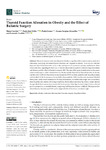Thyroid function alteration in obesity and the effect of bariatric surgery

Ver/
Use este enlace para citar
http://hdl.handle.net/2183/29885
A non ser que se indique outra cousa, a licenza do ítem descríbese como Creative Commons Attribution 4.0 International License (CC-BY 4.0)
Coleccións
- GI-FENM - Artigos [117]
- INIBIC-EENM - Artigos [52]
Metadatos
Mostrar o rexistro completo do ítemTítulo
Thyroid function alteration in obesity and the effect of bariatric surgeryAutor(es)
Data
2022-02-28Cita bibliográfica
Cordido M, Juiz-Valiña P, Urones P, Sangiao-Alvarellos S, Cordido F. Thyroid function alteration in obesity and the effect of bariatric surgery. J Clin Med. 2022 Feb 28;11(5):1340.
Resumo
[Abstract] The most common endocrine disease in obesity is hypothyroidism and secondary endocrine alterations, including abnormal thyroid function, are frequent in obesity. It is unclear whether impaired thyroid function is the cause or the consequence of increased adiposity; furthermore, there are no clear data regarding the best way to dose levothyroxine for patients with both hypothyroidism and obesity, and the effect of bariatric surgery (BS). The aim of the present article is to review some controversial aspects of the relation between obesity and the thyroid: (1) Thyroid function in obesity and the effect of BS (2) Thyroid hormone treatment (THT) in obese patients with hypothyroidism and the effect of BS. In summary: In morbidly obese patients, TSH is moderately increased. Morbid obesity has a mild central resistance to the thyroid hormone, reversible with weight loss. In morbidly obese hypothyroid patients, following weight loss, the levothyroxine dose/kg of ideal weight did not change, albeit there was an increment in the levothyroxine dose/kg of actual weight. From a clinical practice perspective, in morbid obesity, diagnosing mild hypothyroidism is difficult, BS improves the altered thyroid function and THT can be adapted better if it is based on ideal weight.
Palabras chave
Obesity
Endocrine abnormalities
Baratric surgery
Hyperthyroidism
Endocrine abnormalities
Baratric surgery
Hyperthyroidism
Descrición
Review
Versión do editor
Dereitos
Creative Commons Attribution 4.0 International License (CC-BY 4.0)
ISSN
2077-0383






